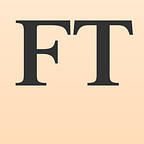Volatility: How ‘Algos’ Changed the Rhythm of the Market
Critics say high-frequency trading makes markets too fickle amid rising anxiety over the global economy
By Robin Wigglesworth
Philippe Jabre was the quintessential swashbuckling trader, slicing his way through markets first at GLG Partners and then an eponymous hedge fund he founded in 2007 — at the time one of the industry’s biggest-ever launches. But in December he fell on his sword, closing Jabre Capital after racking up huge losses. The fault, he said, was machines.
“The last few years have become particularly difficult for active managers,” he said in his final letter to clients. “Financial markets have significantly evolved over the past decade, driven by new technologies, and the market itself is becoming more difficult to anticipate as traditional participants are imperceptibly replaced by computerised models.”
Mr Jabre is not alone. There has been recently a flurry of finger-pointing by humbled one-time masters of the universe, who argue that the swelling influence of computer-powered “quantitative”, or quant, investors and high-frequency traders is wreaking havoc on markets and rendering obsolete old-fashioned analysis and common sense.
